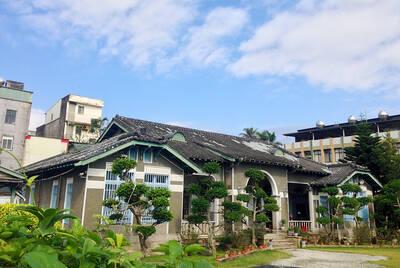An excerpt of Chen Shui-bian's autobiography describing his childhood home reads: "The home was a typical poor peasant's house of brick foundation with mud walls and wattle or tiles on the roof.
Today, the courtyard and the narrow lane out in front of the house still look little different from the days of Chen's childhood." This description was written before Chen won the presidential election and his home became
Taiwan's newest tourist attraction.
Wang Chao-ming never really knew Chen Shui-bian. But this doesn't keep him from spending his days perched on a ladder in the front yard of the president-elect's boyhood home, yelling into a bullhorn, a camera slung around his neck.
"Get your photo taken with the president in front of his very own home!" he says, his horn squealing and popping, pushed to the brink of its technical capacity. "Only $NT100 per person!" A cardboard cutout of Chen's likeness
sways in the breeze before Wang, taped to a makeshift platform.
Long known as a peasant village where farmers toiled dawn to dusk to wring a living from the land, life has been changing at a furious pace for the few hundred residents of Hsi-chuang since Chen's election. With an average of
30,000 to 40,000 visitors a day (140,000 on Sundays) coming to view the boyhood home of Taiwan's "native son", Wang is not the only person eager to capitalize on Taiwan's newest tourist attraction. Crowds of other vendors have been flocking from neighboring villages to set up stalls along the narrow, dusty alleys surrounding Chen's home.
It's because of this that Hsi-chuang - the once quiet farming hamlet that sits like a red brick island in a waving, green sea of rice paddies in Tainan County - more resembles a mixture between haphazard bazaar and travelling circus.
"Live eels!" yells a man surnamed Chao to the stream of visitors who have come on a sunny Tuesday morning.
He has set up his large Styrofoam tub in a shady corner of the courtyard across from A-bian's home. Inside the tub, live eels make sucking sounds as they squirm over one another in a tangled mass. Beside Chao, a woman sells
A-bian hats and mugs along with fresh cloves of garlic. And in the next stall over a Chinese doctor plies his trade before a large billboard covered with large, glossy photos depicting various stages of the skin disease dermatitis. Along with salves and ointments, presumably used to cure
dermatitis, he is also selling A-bian commemorative plates.
Strolling down the alley adjacent to Chen's home, one is just as likely to come across people selling anything and everything from eggs, sausages, baseballs, cactuses and wrenches to A-bian hats, photos and books. It's as
if the people of Hsi-chuang, a place that has long been marginalized economically, are waking up all at once to the fact that, while being a source of pride, Chen's victory is also a new and unexpected way to make some bread.
"I hope this lasts forever,?says Chen Jing-shu who resides in the house directly behind the Chen family home. "Business is good," he says and then breaks off to ask a group of passersby if they want to buy a photo. They browse for a few seconds and begin to move on. "How about a beer then?" Chen yells to their backs.
It's only when the subject turns to A-bian, that Chen quits joking and becomes serious. "He's our first real president, and he's one of us," Chen says. "We'd do anything for him."
As Chen begins to tell stories a group of neighbors and friends gather around, all eager to put in their two cents worth about A-bian. "He was older than me, but I remember hearing my mother talk about how smart he was," Chen says. Before he can get further another man breaks in. "He could read and write Chinese proverbs by the time he was six years old," he yells excitedly. "Without ever being taught!"
"It's really a phenomenon unseen in this day and age," says Chiu Hei-yuan, a sociology professor at National Taiwan University. Chiu attributes the staggering number of visitors to Chen's home to the fact that he is Taiwan's
first president elected entirely by the people. "Lee Teng-hui was popularly elected, but before that he was appointed by Chiang Ching-kuo, so it's not quite the same."
Chiu explains that people in rural areas of southern Taiwan embrace Chen as one of their own and, thus, are eager to visit his home to pay their respects. "They are proud that someone they consider 'one of them' could rise to such great heights."
But another neighbor, Mr. Lin, attributes the crowds to old-fashioned curiosity. "People can't believe that someone from here - a peasant village - could become president. They want to come see the house of such a man with
their very eyes," Lin says.
When asked about Lin's theory, Chiu agrees that he might be onto something. "Most people who are visiting Chen's house are rural, blue-collar workers and farmers who tend to be quite superstitious about Chinese traditional beliefs," Chiu says. "They may think that a person who can rise from such humble origins to the office of the president might come from a home blessed with great feng shui. Some probably think that these positive powers might rub off on them by their being in its proximity"
Whatever the reason for the stream of visitors, nobody in Hsi-chuang seems to want them to stop coming. Chen's mother, however, would most likely appreciate a slow-down. She recently fell ill from overexertion because she tried to greet all the visitors.
The influx, though, is supporting the cottage industry based on Chen's success. From the temple at the village's main square, down to the alley that winds toward Chen's house, every store, every home and every empty space has been occupied by vendors.
But after spending a bit of time in Hsi-chuang it becomes apparent that the force driving the frenzy is not just greed, but a lingering sense of celebration and fun. Men still gather at the A-bian campaign headquarters to talk about the victory over bowls of free soup, and campaign posters still decorate every shop and street corner.
Perhaps a man surnamed Hsu sums it up best as he stands in front of Chen's home squinting at the front door through the afternoon sunlight. After a while he turns around and tears can be seen streaming down his face. "I wanted to come," he says, "because I am so proud that we finally have our own president and we are moving toward becoming an independent country."
He pauses to dry his eyes. "China can't bully us, we are our own country. Chen's election proves it," he says. Just then, Wang sweeps down from his ladder with his bullhorn. "A picture my friend?" he asks Hsu. "Only NT$100
per picture."
Hsu straightens himself and wipes his face one last time with his sleeve. "I'll take two," he replies, climbing up onto the makeshift platform and throwing an arm around the cardboard cutout.

When life gives you trees, make paper. That was one of the first thoughts to cross my mind as I explored what’s now called Chung Hsing Cultural and Creative Park (中興文化創意園區, CHCCP) in Yilan County’s Wujie Township (五結). Northeast Taiwan boasts an abundance of forest resources. Yilan County is home to both Taipingshan National Forest Recreation Area (太平山國家森林遊樂區) — by far the largest reserve of its kind in the country — and Makauy Ecological Park (馬告生態園區, see “Towering trees and a tranquil lake” in the May 13, 2022 edition of this newspaper). So it was inevitable that industrial-scale paper making would

Asked to define sex, most people will say it means penetration and anything else is just “foreplay,” says Kate Moyle, a psychosexual and relationship therapist, and author of The Science of Sex. “This pedestals intercourse as ‘real sex’ and other sexual acts as something done before penetration rather than as deserving credit in their own right,” she says. Lesbian, bisexual and gay people tend to have a broader definition. Sex education historically revolved around reproduction (therefore penetration), which is just one of hundreds of reasons people have sex. If you think of penetration as the sex you “should” be having, you might

July 21 to July 27 If the “Taiwan Independence Association” (TIA) incident had happened four years earlier, it probably wouldn’t have caused much of an uproar. But the arrest of four young suspected independence activists in the early hours of May 9, 1991, sparked outrage, with many denouncing it as a return to the White Terror — a time when anyone could be detained for suspected seditious activity. Not only had martial law been lifted in 1987, just days earlier on May 1, the government had abolished the Temporary Provisions Effective During the Period of National Mobilization for Suppression of the Communist

Hualien lawmaker Fu Kun-chi (傅?萁) is the prime target of the recall campaigns. They want to bring him and everything he represents crashing down. This is an existential test for Fu and a critical symbolic test for the campaigners. It is also a crucial test for both the Chinese Nationalist Party (KMT) and a personal one for party Chairman Eric Chu (朱立倫). Why is Fu such a lightning rod? LOCAL LORD At the dawn of the 2020s, Fu, running as an independent candidate, beat incumbent Democratic Progressive Party (DPP) lawmaker Hsiao Bi-khim (蕭美琴) and a KMT candidate to return to the legislature representing